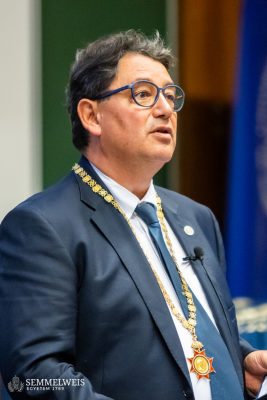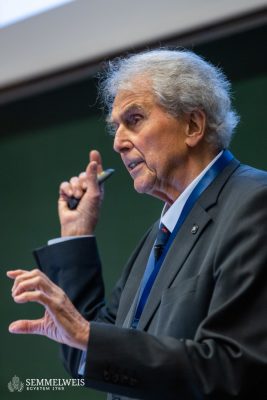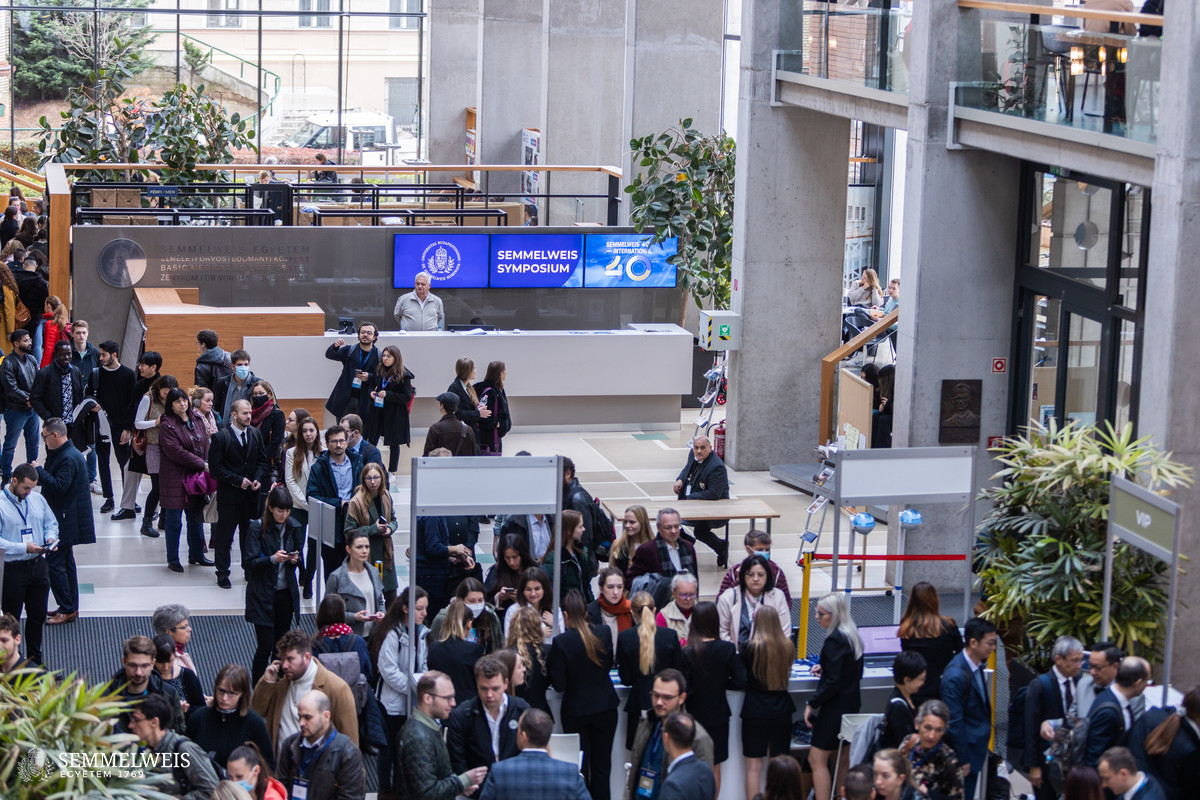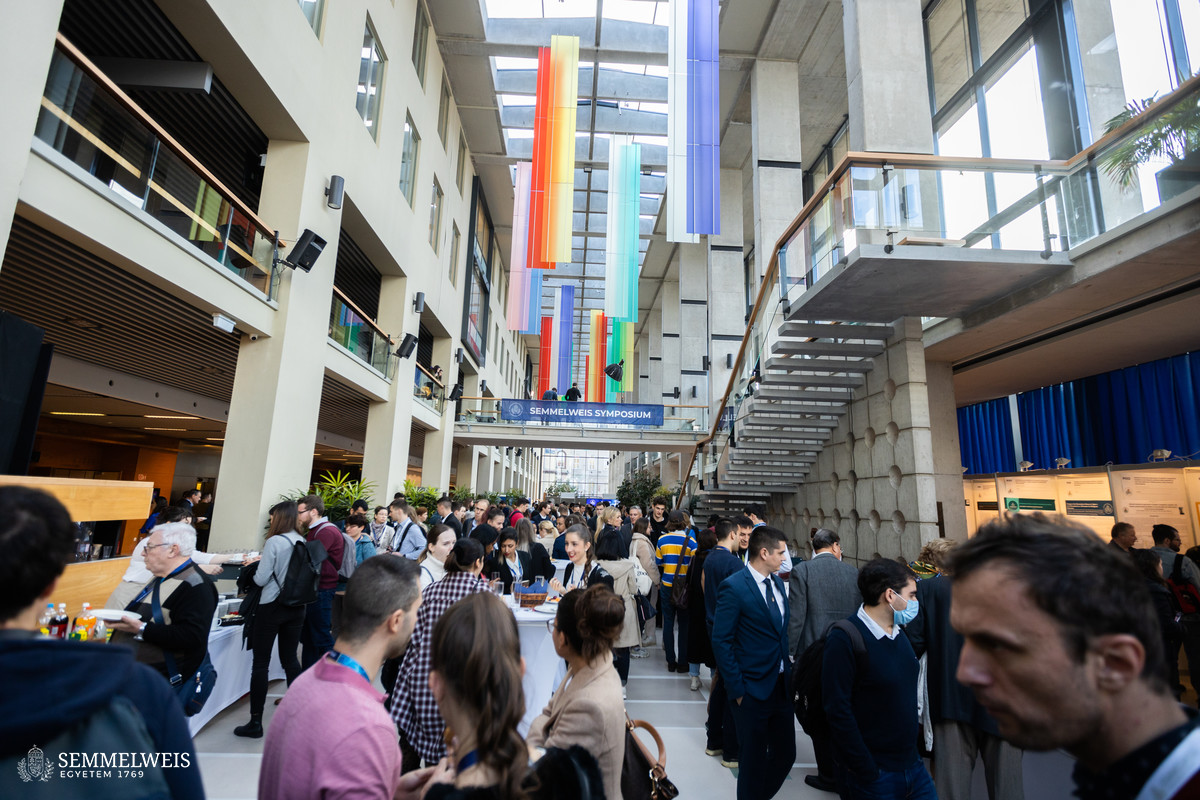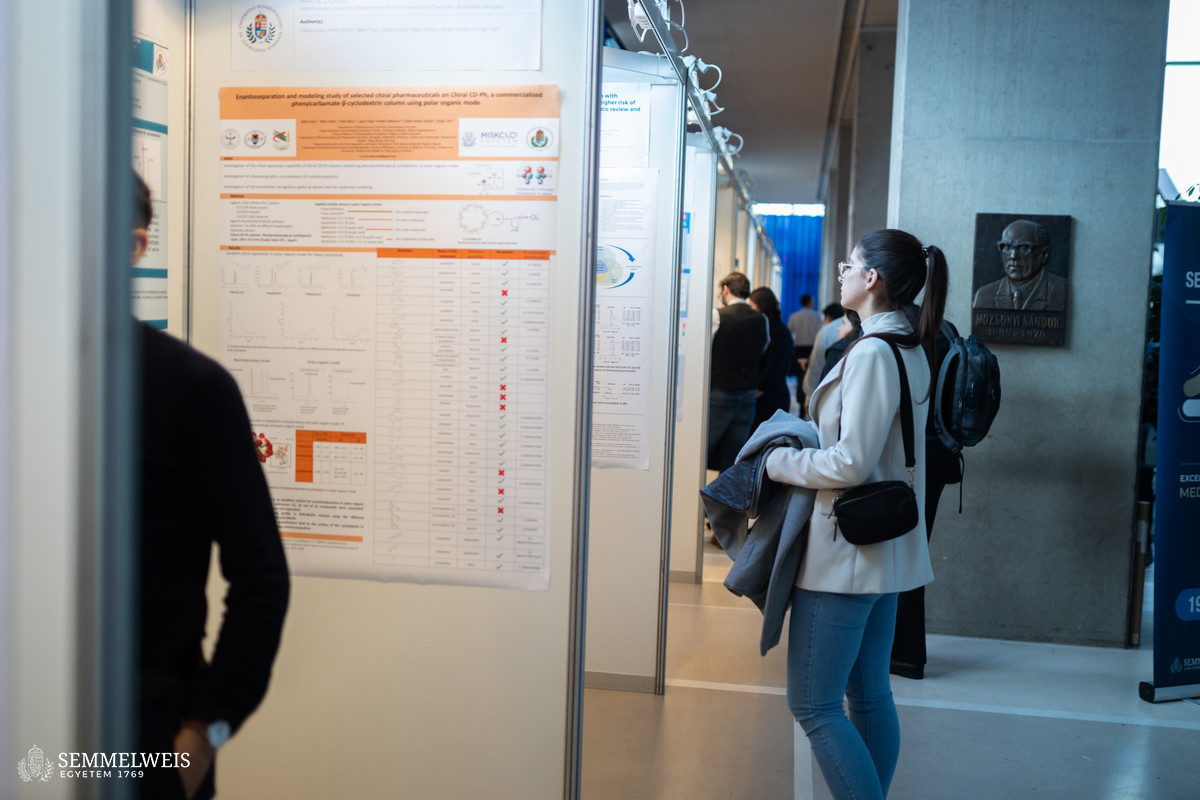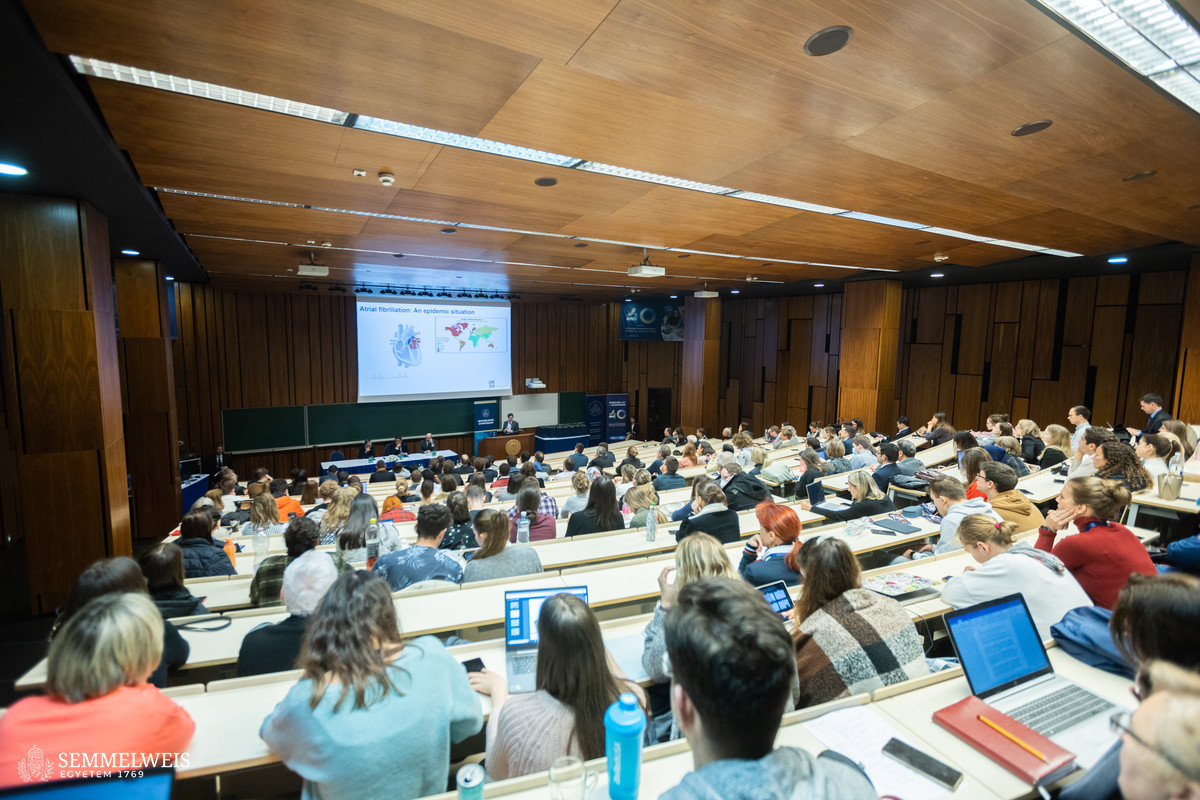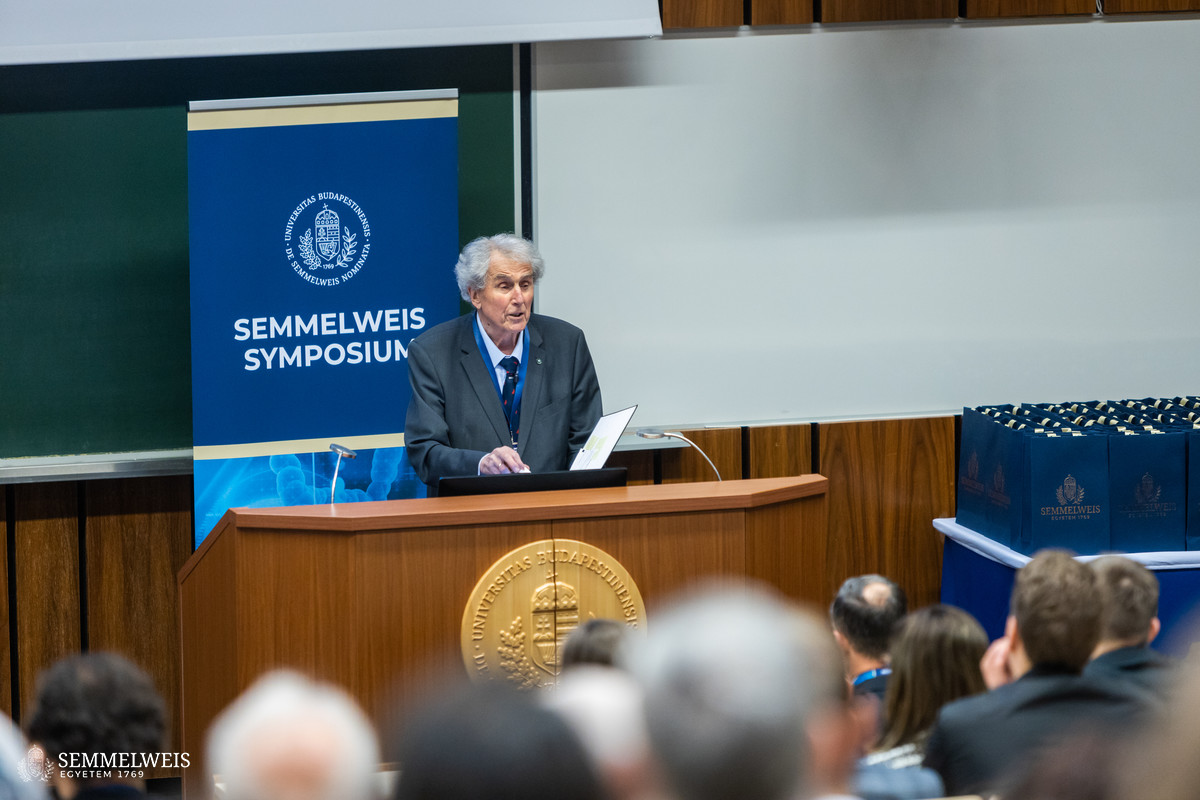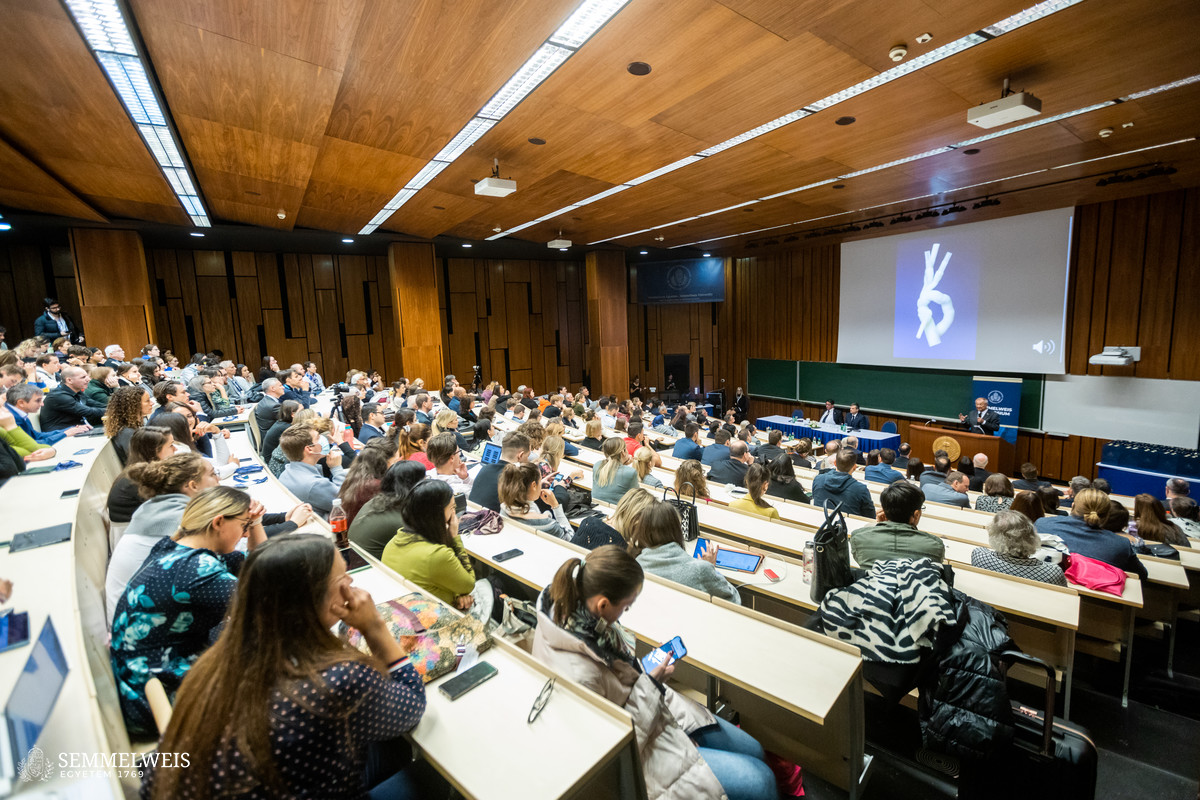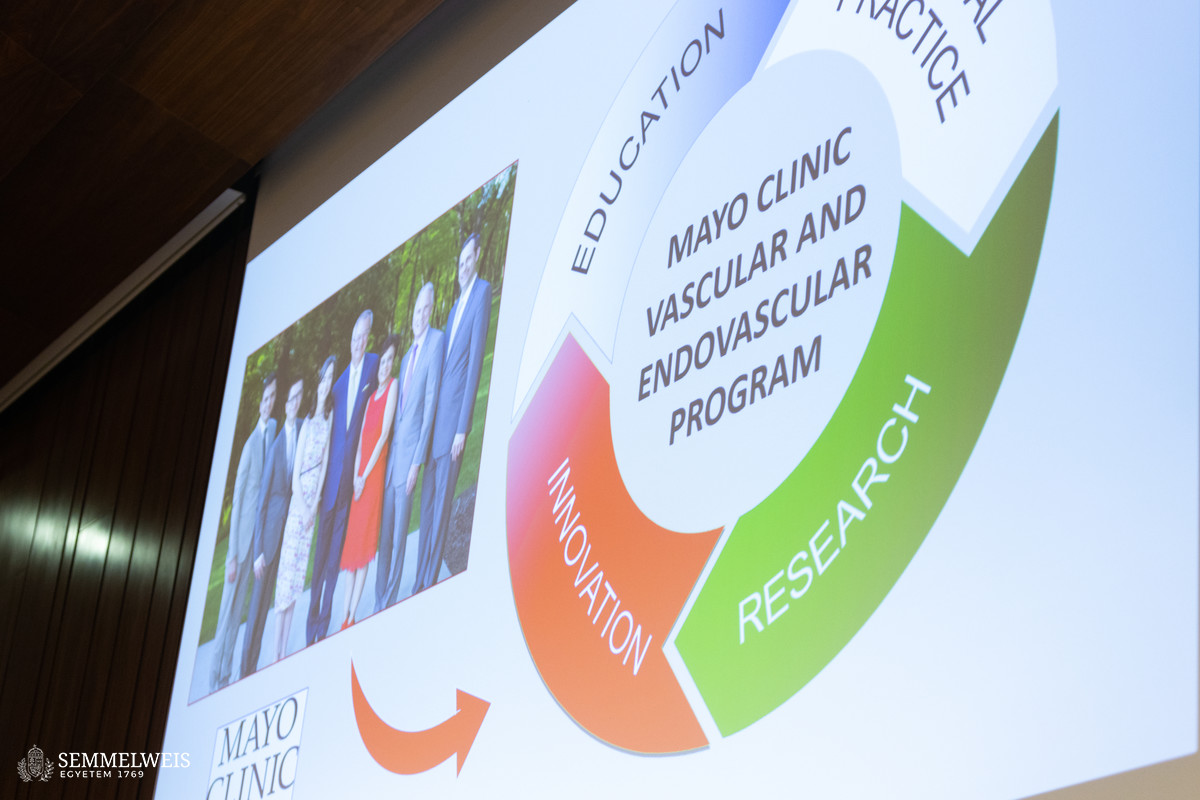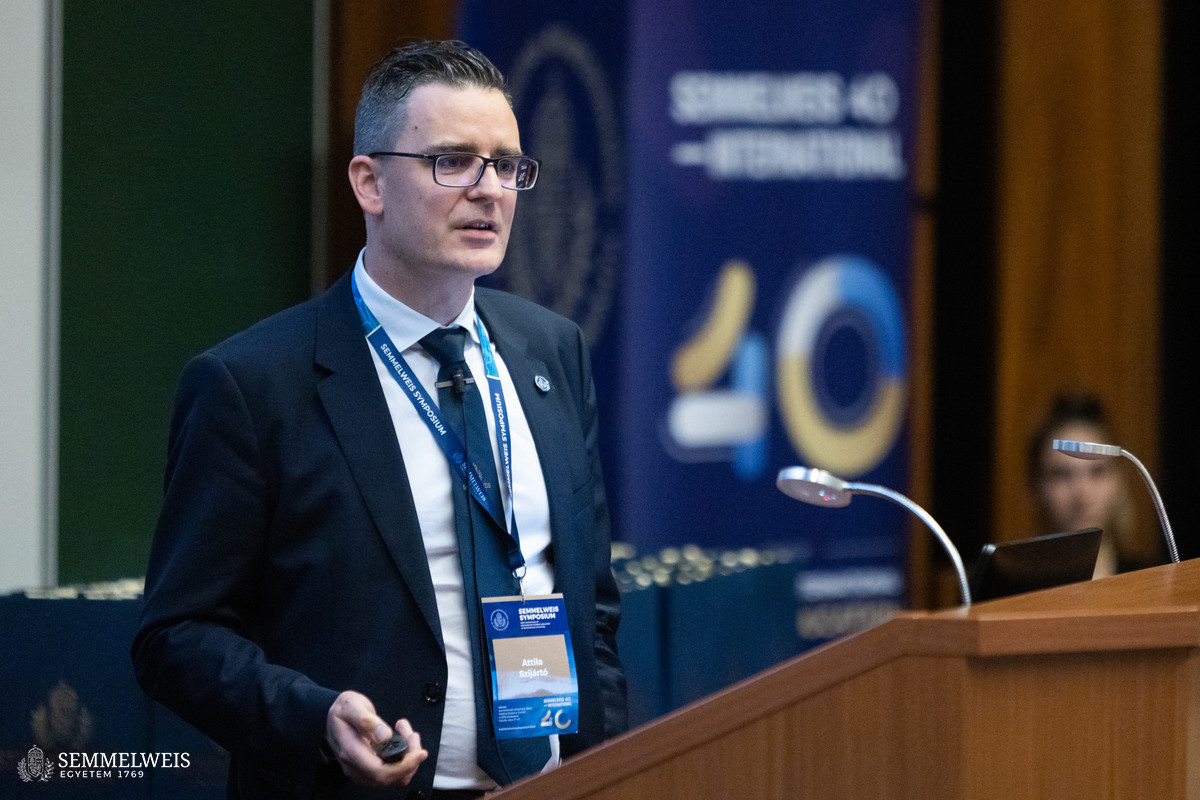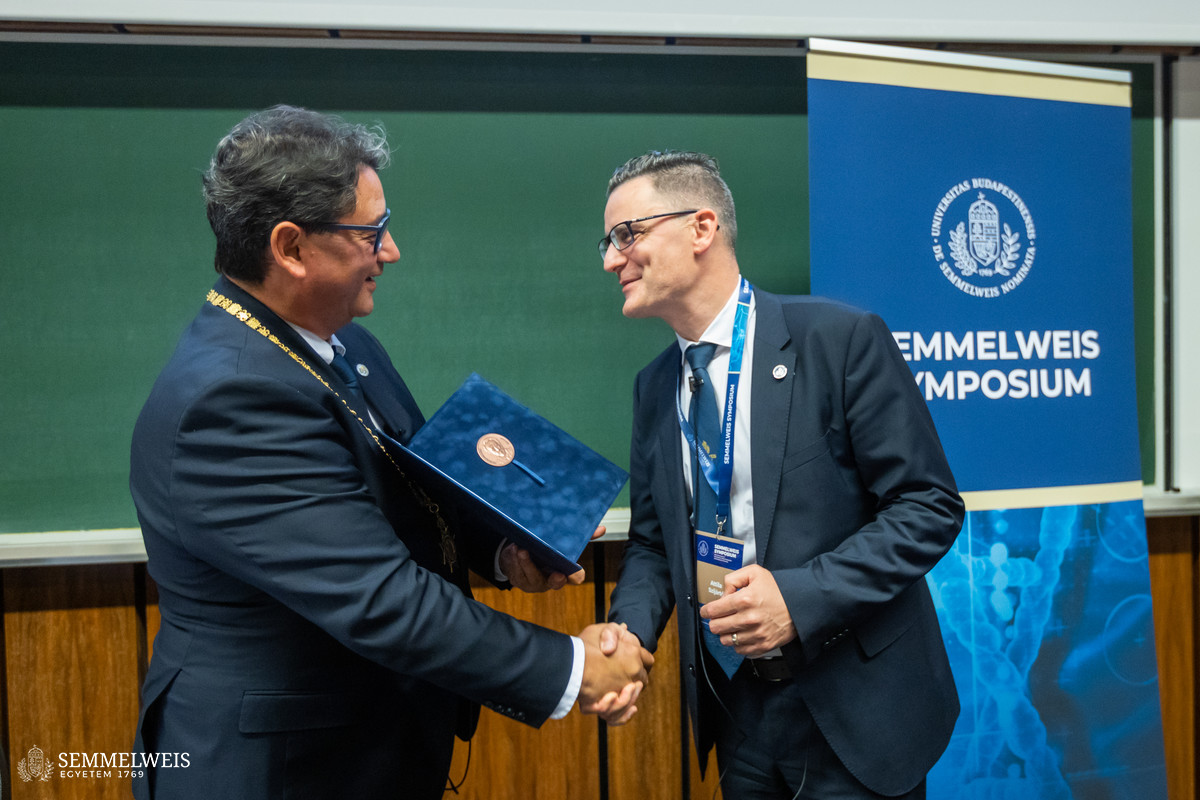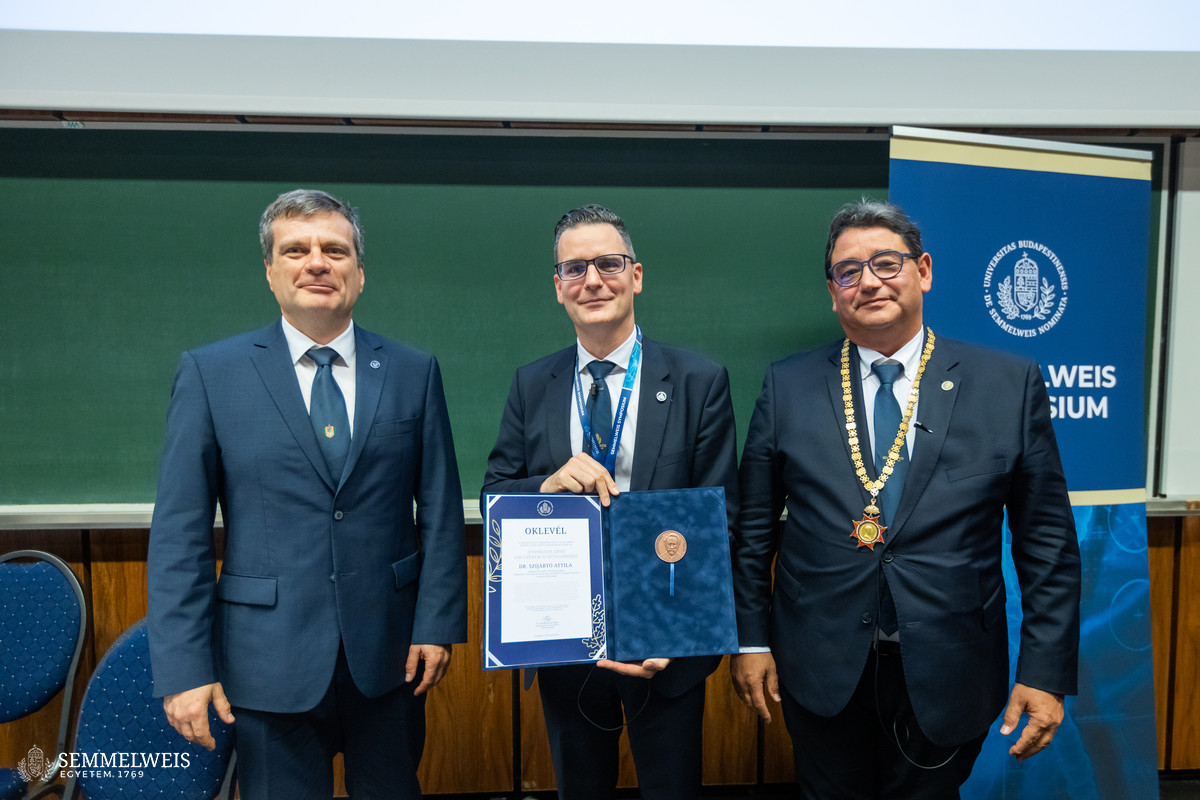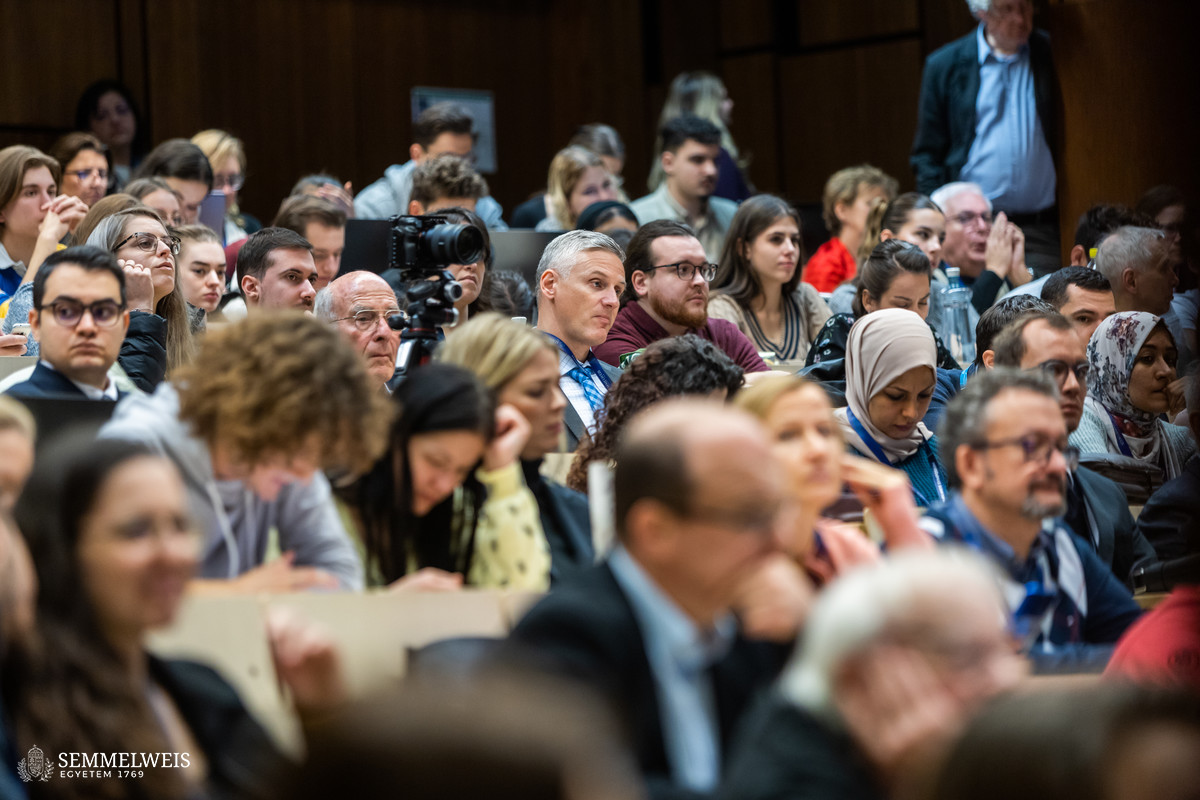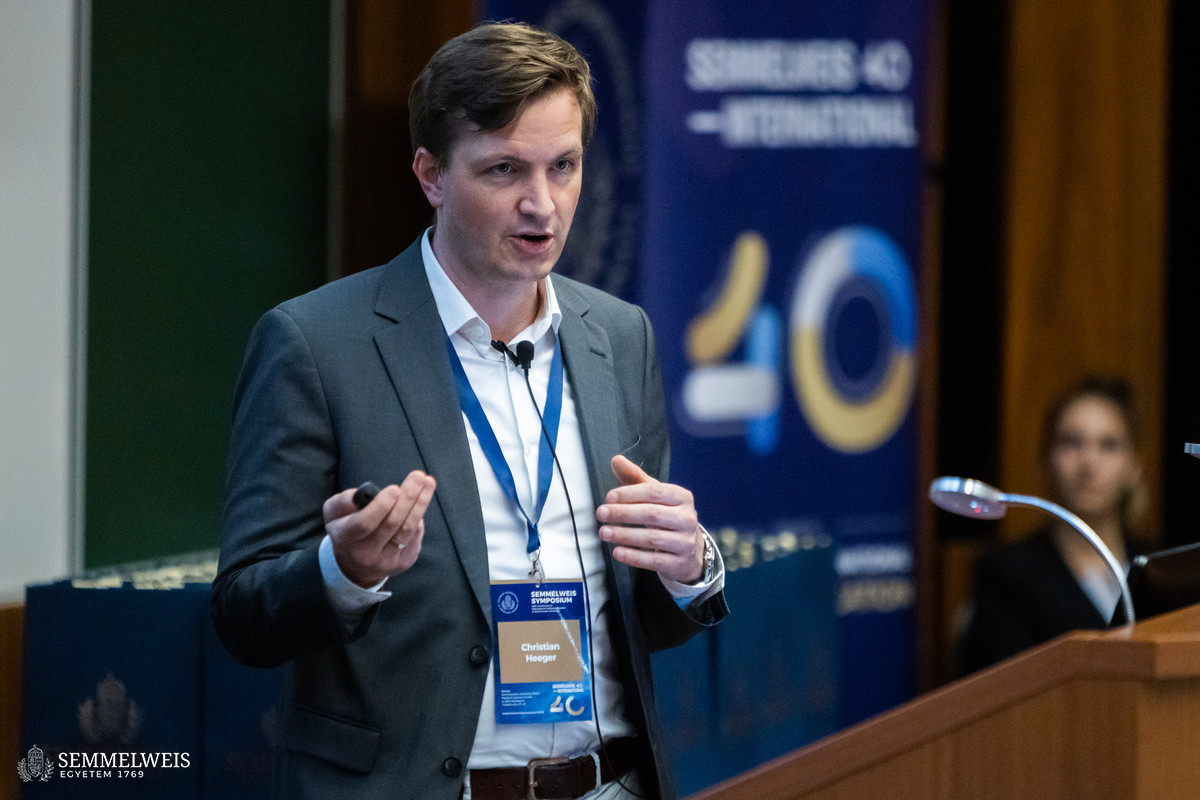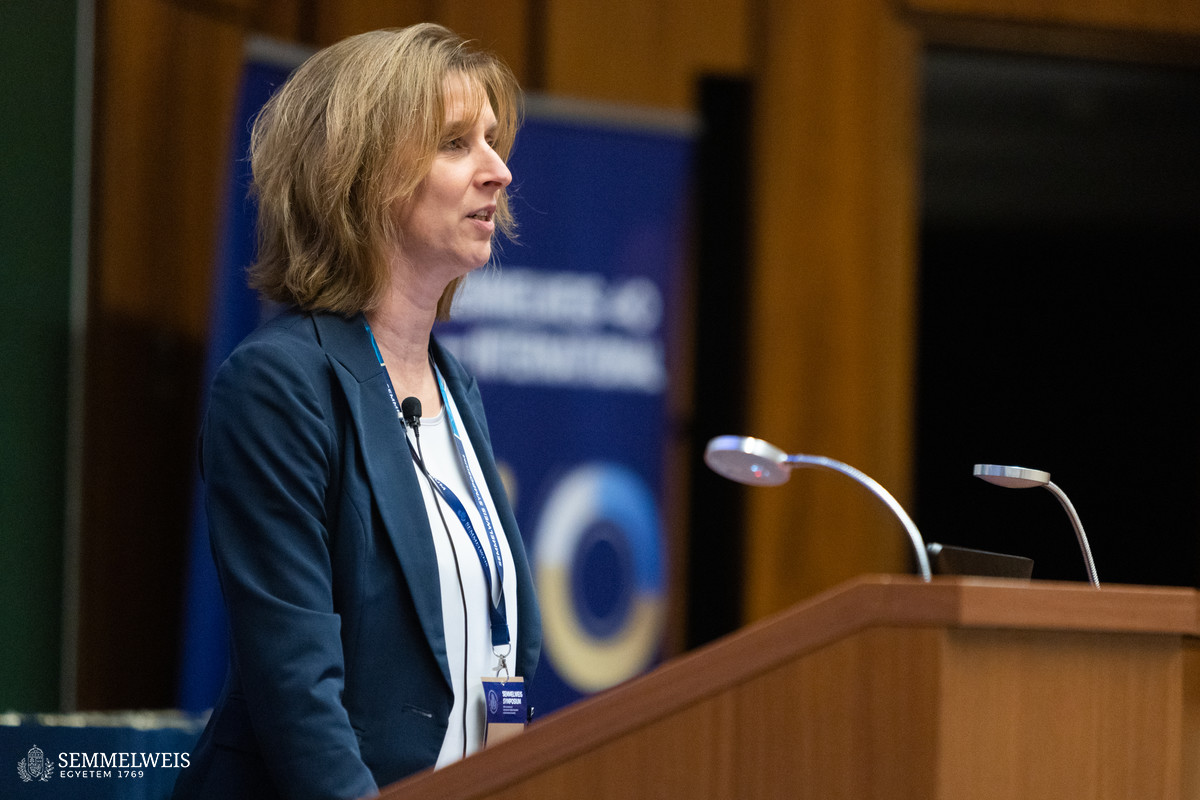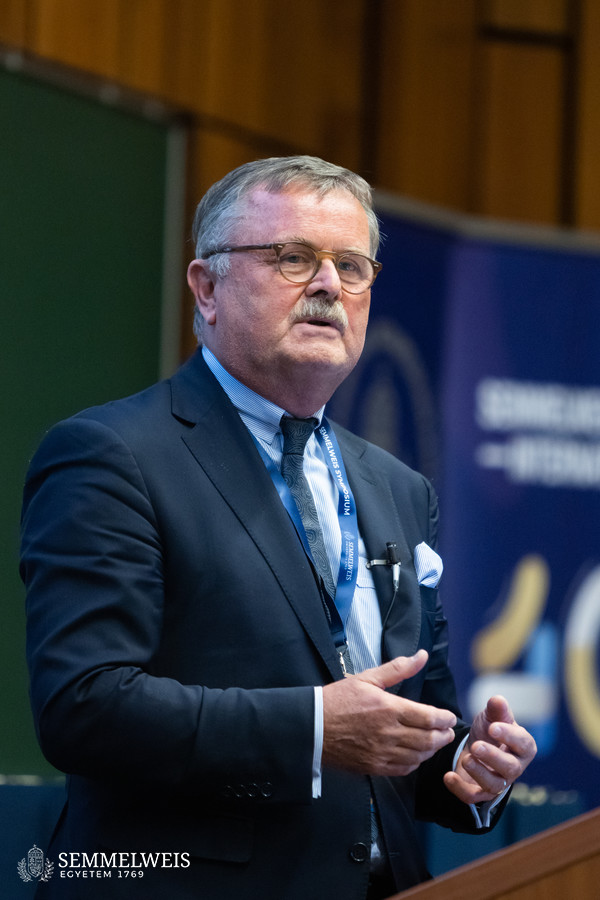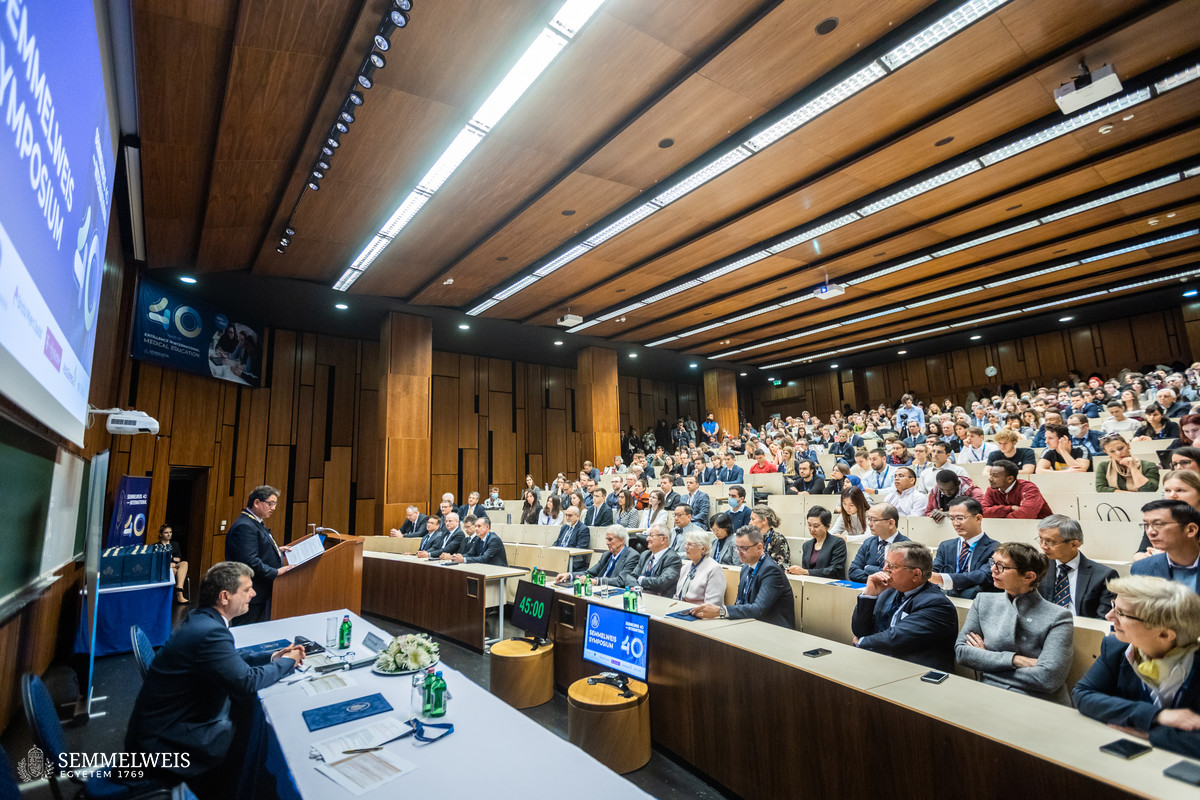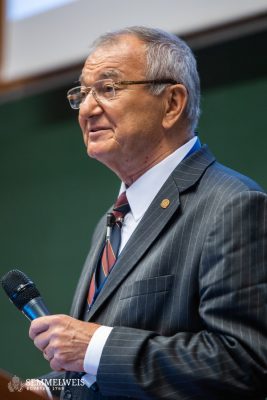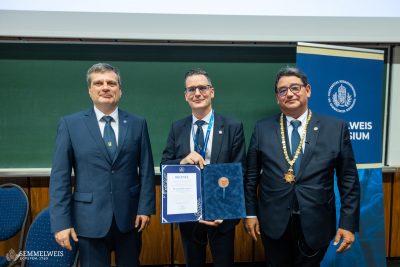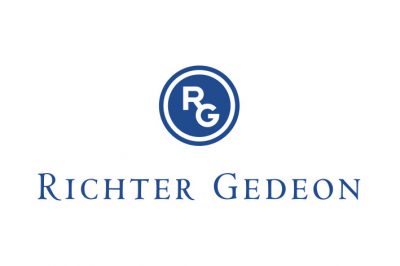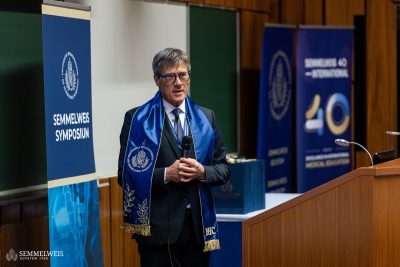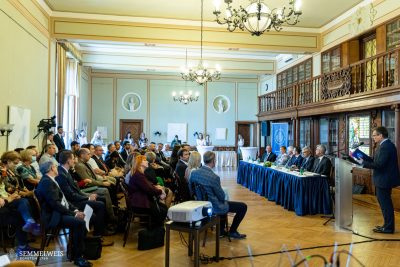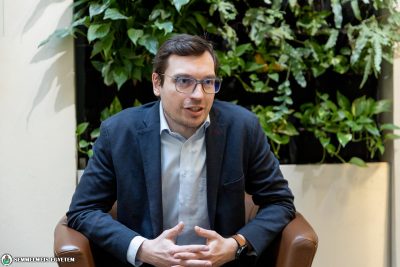“Without science we would not be what we are. And without science we won’t be what we could be,” Dr. Béla Merkely, Rector of Semmelweis University quoted the words of Edward Teller, one of the most famous Hungarian scientists and atomic physicist.
In his opening speech he emphasized, that in the lectures ahead, participants can learn about the latest scientific advances and innovations in the given field from prominent national and international experts. “In addition, the symposium will provide an opportunity to expand international collaborations and build relationships with industry partners, as well as strenghten the sense of belonging together,” he said.
He also mentioned that Gedeon Richter was born 150 years ago, and Semmelweis University joined in the celebrations. “Our university and Richter are bound together by a thousand ties: Gedeon Richter graduated from Semmelweis University. Since 2008, we have had 11 research collaborations with the company Richter and we are currently running several joint projects. In 2019, we also signed a strategic cooperation agreement”, he added, pointing out that they are also bound together by their shared values: serving people’s health, strategic thinking and pursuit of excellence. “Research and innovation is an important part of our activities. That is why I would like to thank Richter for being a major sponsor of our event,” the rector said.
Dr. Béla Merkely also highlighted that according to the latest Times Higher Education world rankings, Semmelweis University is in the top 250, in fact the 236th best university in the world which makes it the best not only in Hungary, but also in Central-Eastern Europe.
Dr. Miklós Réthelyi, former Rector of Semmelweis University reminded that the opening day of the symposium, 7 November is the 253rd anniversary of the foundation of the University of Nagyszombat, the predecessor of Semmelweis University.
He stressed that annually organized Semmelweis Symposium is the most prestigious scientific event of the university and its aim is unchanged since decades: to maintain an international forum of experts of a previously selected scientific are can meet to exchange scientific idea.
Dr. Miklós Réthelyi praised in his keynote speech the merits of András Spät, Professor Emeritus who organized the first Semmelweis Symposium in 1992, then recalled some key points of the previous decades, e.g. genomic medicine, molecular mechanisms, invasive cardiology, cellular signaling, translational oncohematology, microbiology, and personalized medicine.
Péter Gloviczki, Professor Emeritus of Vascular Surgery at the Mayo Clinic, Minnesota pointed out in his lecture “Innovations and disruptive new technologies in vascular surgery and endovascular interventions” the importance of disruptive innovation, how new advanced technology quickly outperforms established methods, reminding the example of electric cars, cell phones, smart TVs or Uber.
The Professor Emeritus presented how fundamental disruptive innovations changed surgical care, and vascular surgery and evoked some milestones of the endovascular revolution praising Nicolai Volodos, and Juan Parodi among others.
Péter Gloviczki outlined the evolution of FB-EVAR program at Mayo Clinic emphasizing that teamwork is essential for successful operations and showing the spectacular development of operation rooms. He concluded with a citation from Steve Jobs: „Innovation distinguishes between a leader and a follower.”
Dr. Attila Szijártó, Director of Semmelweis University’s Department of Surgery, Transplantation and Gastroenterology (STÉG) outlined the role of clinical work, research and education, explaining that 180 liver resections are carried out per year by the STÉG-HPB team. In his lecture “Modern liver surgery: The legend of Prometheus reborn” he recalled that this kind of operation has become significant worldwide, the number of liver resections have increased 7-fold in 20 years.
Answering the question of how can we grow the liver, the director explained the latest developments of selective portal vein occlusion.
At the end of the opening session, the Jedrassik Ernő Award was offered to Dr. Attila Szijártó. The prize aims to reward the author of an independent research proposal based on publications published within the previous three years, which presents in thesis form the outstanding scientific results of a major part of the work carried out at our University in any branch of clinical science. The University Council has named the commemorative medal after Dr. Ernő Jendrassik, former professor of our University, the distinguished Hungarian internist and neurologist.
The following lectures were made on the 1st and 2nd day of the Semmelweis Symposium:
- Dr. Christian Heeger, (University Heart Center – Lübeck, Germany): Cardiac ablation technologies for the treatment of atrial fibrillation
- Dr. Frank Ulrich Montgomery (Standing Committee of European Doctors – Brussels): Corona – a challenge or just another flu?
- Dr. Veronika Müller (Semmelweis University): Challenges of COVID treatment at Semmelweis University
- Dr. Andrea Fekete (Semmelweis University): Novel perspectives in the treatment of COVID associated pulmonary complications
- Marie O’Toole (Rutgers University – New Jersey, USA): International and interdisciplinary collaboration in health care education – an imperativ
- Keith Cole (George Washington University – Washington, USA): Age and cognitive stress influences motor skill acquisition, consolidation, and dual-task effect in humans
- Fatima Zulqarnain: (University of Virginia – Virginia, USA): How artificial intelligence can assist us in pediatric gastroenterology
- Sang-Ngoen Thanyaporn (Naresuan University – Phitsanulok, Thailand): 3D model for studying the molecular mechanisms of amelogenesis
- Stephan Willems (Semmelweis University, Asklepios Campus – Hamburg, Germany): New perspectives in management of atrial fibrillation
- Axel Stang (Semmelweis University, Asklepios Campus – Hamburg, Germany): The gut microbiome – an overlooked strategist in cancer cachexia?
- Daniel Perez (Semmelweis University, Asklepios Campus – Hamburg, Germany): New perspectives in robotic surgery
- Ioannis Kyvernitakis (Semmelweis University, Asklepios Campus – Hamburg, Germany): Twin pregnancy: chance or risk
- Jörg Huwyler (University of Basel – Basel, Switzerland): Advanced drug delivery systems for the anticancer treatment
- Amir Mohammadzadeh (Semmelweis University): Glycine transporter inhibitors in management of neuropathic pain
- Moritz Zürn (Semmelweis University: Phytochemical description of plant samples
- Valentin Schlieper (Semmelweis University): Digital opportunities in pharmaceutical care
- Marion Aw (National University of Singapore – Singapore, Singapore): A wholistic medical education – combining curriculum with a vibrant student life
- Alfred Kow Wei Chieh (National University of Singapore – Singapore, Singapore): Advanced technology to enhance medical education: How we do it in NUS Medicine
- Yap Seng Chong (National University of Singapore – Singapore, Singapore): Changing tomorrow’s health, Today a population health approach to optimising early neurodevelopment
- Roger Foo (National University of Singapore – Singapore): Genetic prioritization from epigenetic maps of human hearts
- Theodoros Kofidis (National University of Singapore – Singapore): The advent of less invasive and personalized heart surgery
- Andrea Maier (National University of Singapore – Singapore): The framework towards Longevity Medicine
- Zoltán Ungvári (Semmelweis University): The future of healthy aging: translation of geroscience discoveries to public health practice
- Ádám Tabák (Semmelweis University): Design of the Semmelweis Study
- Tamás Csípő (Semmelweis University): Understanding determinants of healthy cerebromicrovascular aging: the Semmelweis Emeritus Study
- Illés Kovács (Semmelweis University): Retinal biomarkers of cerebromicrovascular aging
- Anna Csiszár (University of Oklahoma – Oklahoma, USA): Accelerated cerebromicrovascular aging and cognitive decline
- Tamás Kiss (Semmelweis University): Vascular rejuvenation: lessons from heterochronic parabiosis
Sponsors of the Semmelweis Symposium:
- Richter Gedeon
- Bristol Myers Squibb
- T-Systems
- AstraZeneca
- IQVIA
Rita Kónya, Gábor Kiss
Photos: Bálint Barta – Semmelweis University
